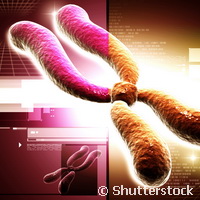New therapy for fragile X chromosome syndrome discovered
Researchers at the University of the Basque Country (UPV/EHU) and the Achucarro neurosciences centre have discovered a new therapy for the fragile X chromosome syndrome, the most widespread cause of autism and mental retardation among male children. This new therapy proposes the modulation of the cerebral endocannabinoid system to alleviate the symptoms of the disease. This groundbreaking scientific finding has recently been published in Nature Medicine. 'Of course, a cure is beyond reach because of the genetic origins of the disease, but the fact that we can improve patients' life conditions is something highly positive,' stated Ms Susana Mato, researcher at the Department of Neurosciences at the UPV/EHU and at the Achucarro centre. Fragile X chromosome syndrome (FXS) is a genetic disease, with an incidence estimated at 1 in every 4,000 individuals. The syndrome arises from a deficit in the expression of the FMRP protein (fragile X mental retardation protein), which plays a fundamental role in the regulation of the neuronal function. Patients with FXS present mental retardation, attention deficit, anxiety, self-harming and autistic behaviour, hyposensitivity to pain and a high rate of epileptic crises. All these anomalous neuronal expressions are regulated by the endocannabinoid system. The research, using genetically modified mice that lacked FMRP protein and that partially reproduced the symptomatology of fragile X chromosome syndrome in humans, have shown that blocking CB1 cannabinoid receptors with the Rimonabant pharmaceutical drug normalizes cognitive alterations, sensitivity to pain and epileptic crises. This finding suggests that the administration of pharmaceutical drugs that block the function of the cerebral endocannabinoid system may very well be a new strategy for treating patients with fragile X chromosome syndrome. Rimonabant pharmaceutical drug has been on the market for some time 'for the treatment of obesity,' explained Ms Mato. 'However, it was used in much higher doses and these high dosages gave rise to certain psychiatric problems, and this is why it was taken off the market.' Nonetheless, the drug has been used a lot in preclinical research into the endocannabinoid system, and its action mechanism is very well established. The next step, as Ms Mato pointed out, should be to better characterise the action mechanism of this treatment, and to test various dosages to see what would be the optimum one to normalize the deficit. Only then would the clinical trials come. 'In fact, we believe this would be relatively feasible, because as it has already been marketed, all that preclinical stage regarding toxicity of the drug for humans has been undertaken, and it is a relatively safe pharmaceutical drug.', she insisted. Although Ms Mato considers the finding to be a great advance, she stressed the importance of clinical trials which could still result in underwhelming outcomes. 'This is a very common phenomenon when developing therapies for psychiatric disorders,' she said.For more information, please visit: Basque R+D+Ihttp://www.basqueresearch.com/berria_irakurri.asp?Berri_Kod=4473&hizk=I#.UWfghVel5ic
Countries
Spain



